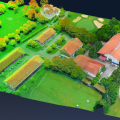
The Office for Spatial Data Management (OSDM) has signed a Memorandum of Understanding with the Open Geospatial Consortium (OGC).
OSDM is currently working to unite the standards work being done by organisations across Australia, such as Defence Imagery and Geospatial Organisation (DIGO), Cooperative Research Centre Spatial Information (CRCSI), Public Sector Mapping Agencies (PSMA) Australia and the Australia New Zealand Land Information Council (ANZLIC).
This fits perfectly with the OGC approach of creating open, consensus-based standards, i.e. gaining input from and driving collaboration across a diverse range of geospatial industry stakeholders.
The OSDM and the OGC will encourage cooperation between the members of the OGC Working Groups and OSDM stakeholders. Cooperative activities between the OSDM and the OGC will be performed in accordance with accepted policies and procedures of each organisation.
The ultimate aim will be to streamline the geospatial standards activities in Australia (both organisations also work closely with ISO TC211), education and promotion to help improve business processes, reduce duplication of effort, protect long-term technology investments and reduce risk associated with information infrastructures.
Both organisations are seeking to incorporate standards into government policy while showing possible return on investment for those implementing and using standards. As part of the MoU, both organisations will seek funding and in-kind resources to advance joint OGC interoperability initiatives (e.g. OGC testbed, pilot and experiments (as defined at www.opengeospatial.org/ogc/programs/ip) to support agreed-upon objectives.
Program activities officiated under jointly-acquired resources will be based on Australian and New Zealand use cases and organisational requirements, be open to support by the OGC membership in Australia and worldwide, and focus on organisational best practice.
During his keynote presentation at spatial@gov 2010, Drew Clarke, Secretary of the Commonwealth Department of Resources, Energy and Tourism (and Minister responsible for Geoscience Australia) highlighted the importance of standards and interoperability to drive the uptake and acceptance of spatial information across government in Australia.
Steven Ramage, executive director of the OGC also delivered a keynote presentation in the same session around ‘Standards, Interoperability and Business Value’. Steven said:
“This has been a tremendous event providing a range of views from across government in the Oceania region. The announcement regarding the MoU with the Office of Spatial Data Management is very important for us to develop our existing relationships with a number of industry-leading organisations in Australia, including Geoscience Australia, and to build new relationships.
“We have an opportunity to continue our work in the region to get closer to delivering technical and organisational interoperability for geospatial information, and the associated business benefits.”
During his presentation Steven also introduced a revised membership category for the OGC called GovFuture, which is aimed at local-level and sub-national governments worldwide.
This category offers something different from participation in standards development: it’s about gaining access to valuable industry knowledge that is transferred through the OGC mechanisms, such as meetings, conference calls and webinars.
However, most importantly in this time of tight fiscal conditions, it is about gaining access to OGC best practice papers, participating in government webinars and understanding what other organisations are doing in this sector in Australia and further afield. Steven told delegates that more information will be released shortly by the OGC regarding this cost-effective, entry level membership to the OGC.







